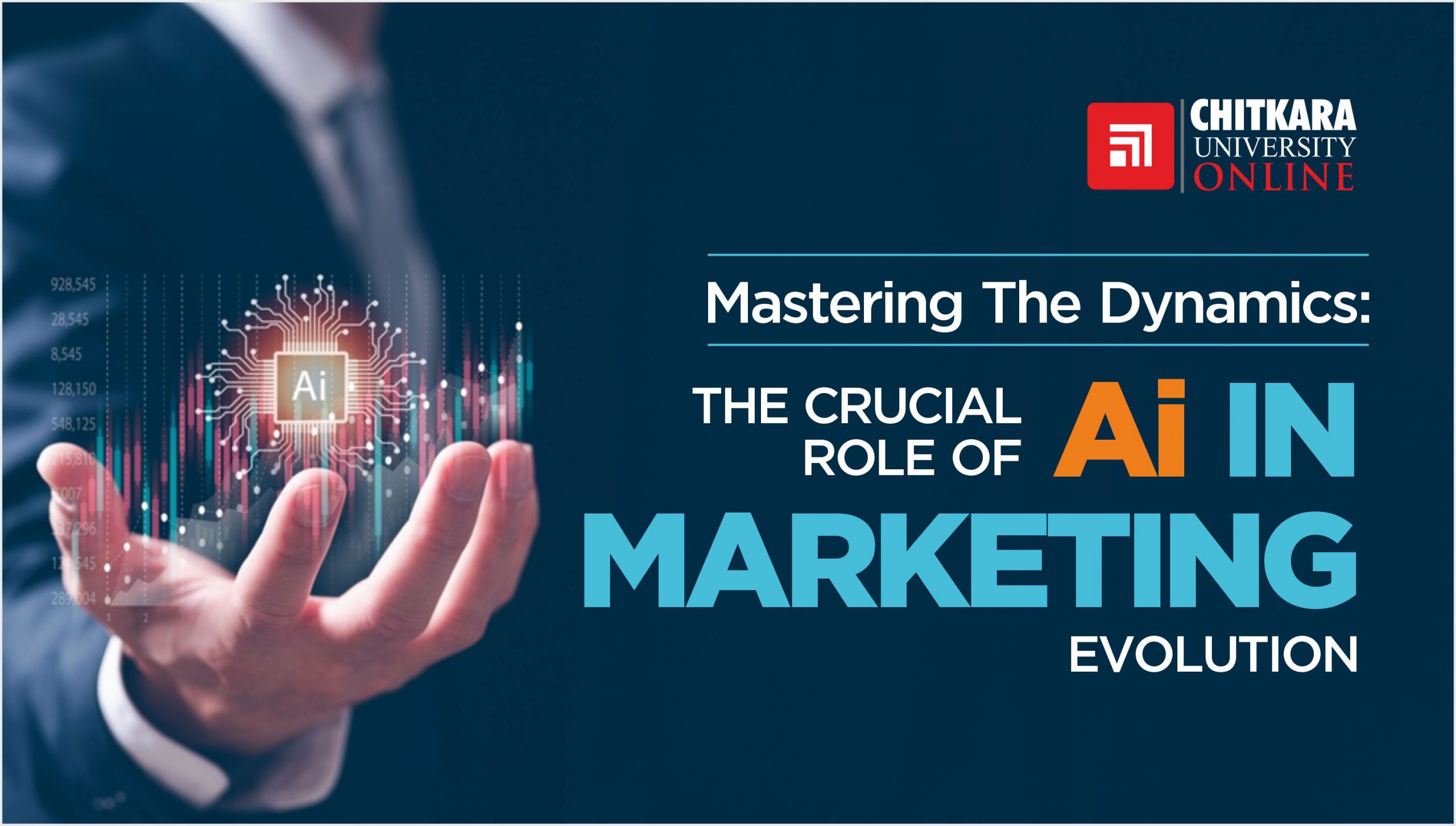Many organizations and their marketing teams are now adopting intelligent technology solutions to encourage operational efficiency when it comes to improving customer experience. These solutions are introduced in the form of AI marketing solutions, playing a pivotal role in the evolving landscape of AI in marketing.
AI in marketing allows marketers to gain a more nuanced and comprehensive understanding of their target audiences. The AI-driven insights gathered with this optimization process can be used for driving conversions while making the workload simple for marketing teams.
In this blog, we will see the role of AI in marketing evolution.
Role of AI In Marketing
AI Marketing uses artificial intelligence technologies for making automated decisions based on data collection, data analysis, and additional observations of audience and economic trends that can impact marketing efforts.
Generative AI is often used in marketing efforts where speed is important and AI tools use data and customer profiles to learn how to communicate with customers while serving them tailored messages at the right time without any intervention from marketing team members.
For many of the present world digital marketers, Generative AI is used for expanding marketing teams and performing tactical tasks that require less human nuance. Some of the common AI marketing use cases include the ones mentioned below.
1. Data Analysis
AI helps in collecting and sorting large amounts of data from many campaigns and programs that can otherwise be sorted manually.
2. Natural Language Processing
AI helps in creating a human-like language for content creation, customer service bots, experience personalization, and much more.
3. Automated Decision Making
AI marketing tools help in which marketing or business growth strategy should be used on the past data or outside data inputs.
4. Media Purchases
AI helps in predicting the most effective ad and media placements for a business to reach its target audience and maximize marketing strategy ROI.
5. Content Generation
AI helps in writing both short and long pieces of content for a marketing strategy including video captions, email subject lines, blogs, website copy, and more.
6. Real-time Personalisation
AI helps in changing a customer’s experience with a marketing asset including web pages, social posts, or emails to fit in the customer’s past preferences and encourage a certain action including clicking links, signing up for something, or purchasing a product.
How to Use AI In Marketing?
It is significant to begin with a detailed plan when using AI in marketing campaigns and operations. This makes sure marketing teams minimize costly challenges and achieve value from their AI investment in minimal time. In implementing AI marketing, some factors should be considered.
1. Establishing Goals
As is with any marketing program, clear goals and marketing analytics must be established for AI marketing programs. You can start by finding areas within campaigns that can stand to be improved including segmentation. You can establish clear KPIs that can explain how successful the AI-augmented marketing campaign has been and this is specifically important for qualitative goals including improved customer experience.
2. Data Privacy
At the beginning of new marketing programs, it is important to be sure that AI does not cross the line of acceptable data in the name of data personalization. It is important to ensure that data privacy standards are well established and programmed into the AI marketing platforms as required to maintain compliance and customer trust.
3. Data Quantity
To begin with AI marketing, digital marketers must have a vast amount of data at their disposal. This data helps in training the AI marketing tool in customer preferences, external trends, and other factors that can impact the success of AI-enabled marketing campaigns. The data can be taken from the organization’s CRM, old marketing campaigns, and website data. In addition, marketers can also supplement this with second and third-party data including location data, weather data, and other factors that can contribute to a purchasing decision.
4. Maintaining Data Quality
As AI and machine learning programs consume more data, they learn to make accurate and effective decisions. In case the data fed to AI marketing programs is not standardized and error-free, the insights will not be useful. The data can cause decisions that can hurt the bottom line rather than help it. Before you can implement an AI marketing program, it is important to coordinate with data management teams and other lines of business to establish processes for data cleansing and data maintenance. The data dimensions included are timeliness, completeness, consistency, relevance, transparency, accuracy, and representativeness.
5. Integrated AI Marketing Strategy
Most marketers find their AI tools are effective when integrated with their existing marketing strategy as opposed to stand-alone tactics. AI marketing tools create opportunities to optimize steps in a strategy that can be labor-intensive including data analysis, risk of inaccuracy, etc. By using AI, marketers can leverage powerful forward-thinking methods to take their marketing ahead and also build on the foundation of marketing strategies that have been used in the past.
Study Marketing To Integrate AI In Marketing
The rise of social media platforms including online content and e-commerce has sparked considerable growth and change in the marketing industry. Businesses value leaders who understand how to integrate marketing strategy with the fast-evolving digital landscape.
In case you want to learn how to increase your earning potential and prepare for career advancement in the field of marketing then you must join an online MBA in Marketing at Chitkara Univesity Online. The program teaches concepts like AI in Marketing, Inbound Marketing, Outbound Marketing, and many more.
The Online MBA in Marketing is suitable for entry to mid-level professionals who are prepared to move into decision-making positions and veteran marketers who want to expand their expertise in the digital domain.
Also Read: Career Opportunities After Completing an Online Finance MBA
To Sum It Up
To succeed in the fast-paced marketing industry, it is important to take the initiative to learn more about AI and how it can improve marketing outcomes while being aware of appropriate use and limitations. Online MBA in Marketing from Chitkara University Online offers the perfect opportunity to accomplish this goal. If you wish to grow in the field of marketing then you must pursue this program to achieve your professional goals.
FAQs
1. What is AI marketing and why is it important today?
AI marketing uses artificial intelligence tools to make data-driven decisions, automate tasks, and enhance customer engagement. It’s important because it helps brands stay competitive in an era where speed, personalization, and accuracy matter most.
2. How does AI personalize the customer journey in real time?
AI analyzes customer behavior instantly and adjusts content like emails, website pages, or product suggestions to fit user preferences—boosting engagement, retention, and conversions without manual intervention.
3. Can AI handle creative tasks like writing content or captions?
Absolutely. AI-powered tools can generate blog posts, product descriptions, email subject lines, video captions, and more. While human oversight adds nuance, AI speeds up the content creation process dramatically.
4. What are the essential data requirements for using AI in marketing?
To succeed, AI tools need access to vast, clean, and relevant data—such as past campaign metrics, CRM insights, customer behavior, and even third-party data like location or weather—to make informed, real-time decisions.
5. How can marketing teams ensure ethical use of AI tools?
By setting clear data privacy standards, regularly auditing AI decisions, and ensuring transparency in how customer data is used. Responsible use of AI builds trust and aligns with evolving consumer and regulatory expectations.





